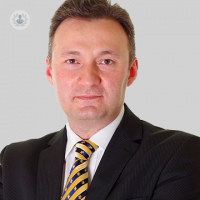An expert guide to non-cancerous breast conditions
Written in association with:Changes to the breasts, such as painful lumps or nipple discharge can understandably be a cause for distress and concern. Ruling out cancer is an important stage in the diagnosis of conditions affecting the breast. After this, however, women may need further care to manage pain and other symptoms of non-cancerous breast conditions.
We've invited leading consultant oncoplastic breast surgeon Mr Hazem Khout to offer expert insight on the most common benign conditions of the breast and how lifestyle advice can help women to manage them in this informative article.

What are the symptoms of benign breast conditions?
In terms of benign breast conditions, pain, lumps or a combination of painful lumps are the most common presentations of benign breast conditions, making up around ninety per cent. Sometimes benign conditions can present with nipple discharge or nipple changes.
What are the most common benign breast conditions?
The most common benign breast conditions are benign thickening in the breast due to hormonal changes, cysts or fibroadenomas. Sometimes patients also experience some benign discharge from the nipple, especially those who smoke.
Can some benign breast conditions pose a potential future cancer risk?
This is very rare and doesn't relate to any common benign conditions such as cysts, fibroadenomas, thickening in the breast tissue, infection or discharges.
However, there are very, very few conditions that actually can potentially lead to breast cancer in the future. This, of course, needs to be discussed with surgeons and needs to be examined in the clinic and assessed properly. The patient will be advised on their individual case regarding conditions that could put them at a slightly higher risk of having breast cancer in the future.
Can benign breast conditions be prevented or avoided?
It’s important to understand that benign breast changes are actually part of the ageing process of the breast and as such it is actually very unlikely that we can prevent that. Therefore, for ladies who have cysts, it's difficult to say whether they would have more cysts in the future. The key point here is for the patient to be breast aware and examine herself at least once every month. Should any problems or issues arise, it's important to speak with your GP or breast surgeon.
Can benign breast conditions be painful to live with?
Breast pain is one of the benign conditions that ladies might have to live with. However, there are many things that we can do to relieve that pain. For instance, breast pain caused by hormonal changes can sometimes be relieved by having a full assessment. Therefore the patient can be reassured that what she's complaining of is actually nothing to worry about.
Some studies show that reducing or completely stopping caffeine intake might also improve breast pain. Also, taking evening primrose oil or starflower oil can be helpful. Cysts can also sometimes cause pain on being touched. Seeing a specialist and having an exploration of that cyst can also relieve the pain. It's very important for the patient to be reassured and I find it is a very important factor in reducing the patient’s general discomfort.
How do you help women with benign breast conditions in your clinic?
The priority in the clinic is to make sure that we're not dealing with anything suspicious or cancerous. To rule that out, we conduct a triple assessment, which is the golden standard of testing for breast conditions. That is done by doing an examination, appropriate imaging and then appropriate tissue sampling if needed.
Once we have established that we're dealing with a benign condition, then we can reassure the patient and give them advice about how to deal with these conditions. For example, if the patient is found to have a cyst, we can give long term advice. This can relate to what they should do if such a cyst or lump appeared in the future. Similarly, if the main issue is pain or thickening in the breast tissue, we can go through the examination with the patient and ensure they know how to examine themselves and also how to relieve the pain with simple lifestyle advice.
If you're concerned about having a non-cancerous breast condition, you can book a consultation with Mr Khout by visiting his Top Doctors profile.



